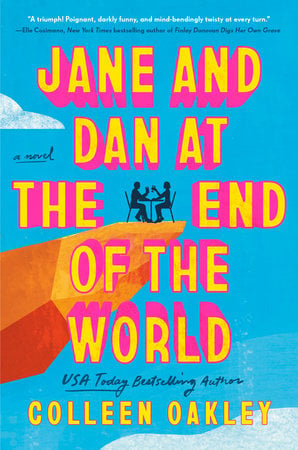This fun, witty novel opens on author Jane Brooks being questioned by police, not only as a witness to a crime but also because her novel was found in the front seat of a van at the scene—a novel that describes almost exactly what had transpired: a group of armed activists taking over an upscale restaurant.
Jane and Dan at the End of the World is not an environmental book—despite the activists taking over the restaurant being part of an underground environmental organization—but it is a worthy addition to any summer reading list for its endearing (if often hapless) characters, its pacing, and its perfect balance of madcap adventure with insights into family, marriage, and motherhood.
Jane and Dan leave their teenagers a home and make the long drive to the ridiculously expensive La Fin du Monde restaurant to celebrate their nineteenth (according to Jane) or twentieth (according to Dan) wedding anniversary instead of celebrating as usual at Macaroni Grill, thanks to Dan having won a raffle (which, as it turns out, was for the reservation only, not for the cost of the nine-course meal).
Once there, Jane proceeds to ask Dan for a divorce, something she’s been contemplating for a while. It’s not that she doesn’t love him, but: “She loved him the only way you can love someone who you’ve been with for nearly half your life. It’s the same way you love your arm, she often thinks. Not your lungs, mind you. Your lungs are a necessity. But your arm. It’s always there. It’s a part of you. You could live without it, but honestly it would be easier not to.” Yet finally, faced with evidence that he is having an affair, she realizes it’s time to end the marriage.
But they don’t make it through their first course before the restaurant is taken over by terrorists with assault rifles. In the moments that follow, Dan, terrified, is ashamed of his inaction while in the meantime Jane is wondering “why the entire opening act of her novel is playing out in front of her eyes.” Her book is six years old and her writing career has stalled; even Dan says, “This can’t be like your book because no one has read it.”
The “terrorists” are part of the action organization Force of Nature, and the aptly named restaurant was chosen as the target because one of its patrons was supposed to be dining there that night: Otto St. Clair, a Silicon Valley tech billionaire whose environmental sins the group would like him to pay for.
While the hostage situation is farcical enough not to be scary, there is plenty of other drama, including a few delicious twists about the activists and their connections to Dan and Jane. And the big mystery is why the hostages imitate Jane’s novel step by step, and whether life will imitate art in the end, as what happens in Jane’s book is “really, really bad.”
Despite the (minimal) violence and confusion, the hostage situation feels secondary to the very real stakes of Jane and Dan’s marriage and family. Even as hostages, the two can’t stop arguing—yet as the evening wears on, they each begin to rediscover what they love about each other, as well as what they would miss should one of them not make it.
Jane especially takes stock of her life; prior to this night, she’d been mourning her failed career as a novelist while not appreciating her value as a mother. “Tears prick her eyes as she realizes, despite her initial fumblings and resentment of the title, over the years motherhood wormed itself so deeply into the core of her identity, the fabric of her very being, that though her children are far too old and too big to be held, Jane catches herself swaying when she holds something in her arms—a watermelon in the grocery store, the neighbor’s cat.”
And Dan has revelations of his own: “He’s seen every part of Jane, every part—and while some people think it’s the air of mystery, the unknown, that is alluring in a partner, for Dan it’s always been the knowing. The seeing of Jane, warts and all, and loving her anyway.”
The environmental issues that spark the plot come up only briefly near the end of the book, literally as a bomb is ticking—the perfect metaphor—but even if this isn’t a novel about the environment, it’s a novel that includes the planet among the things that matter, and it captures the doubts, regrets, and angst most of us humans live with in an uncertain world. And in the end, as Jane realizes, it’s about faith—“deep down, Jane knows that living is sometimes jumping off a cliff, not knowing if you’re going to make it to the bottom.”

Midge Raymond is a co-founder of Ashland Creek Press. She is the author of the novels Floreana and My Last Continent, the award-winning short story collection Forgetting English, and, with John Yunker, the suspense novel Devils Island.

